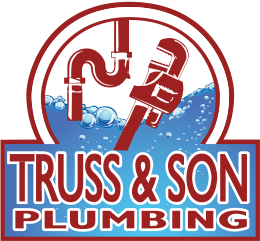YOU CAN TRUST TRUSS!
Family Owned & Operated Since 1979

There is no such thing as a convenient time to have a plumbing emergency. So when a situation arises, you need a plumber, not an answering service. You can breathe a little easier knowing that quality service is just a phone call away and we’re available 24/7 to answer that call
Top 10 most asked plumbing & Aerobic Septic questions
How do I get rid of the odor coming from my garbage disposal?
Foul odors occur from a buildup of food debris within the disposer. To eliminate this odor, place ice cubes, and lemon or orange peels in the disposal and run for 30 seconds. While it is still running, squirt a little liquid dish detergent into the disposal. Run cold water for about 30 seconds to rinse all the debris away.
Can grey water run on top of the ground?
No. All grey water (water from washing machine, sinks, showers, or bathtubs) must be discharged into a licensed septic system or into a designed subsurface grey water system.
My water heater makes a rumbling noise. What is going on?
The rumbling noise is due to sediment buildup inside the water heater. Start by draining the water heater. Follow the step–by–step directions printed in the instructions that came with the water heater. If this doesn′t help, replacement of your water heater may be required.
Do I have to install an aerobic system?
The type of system to be installed on a property depends on the site/soil evaluation that must be done. Most of the soils in Angelina County do not support the installation of a conventional septic system. Conditions that would keep a conventional septic system from being installed might be clay soil, high ground water conditions and/or seasonal wetness.
Can I water my garden with my aerobic system sprinklers?
No. Though the water has been treated, it is not allowed to sprinkle gardens, orchards and/or crops.
How often should I have my septic tanks pumped?
It is recommended that you have your septic tanks pumped out every 2 to 5 years in order to keep your system working properly.
How often should I have my septic system inspected?
It is recommended, to have your sewer system inspected every 4 months and pumped a minimum of once every 2-5 years. You may not be experiencing any problem now but a full septic tank may allow unwanted solids to flow into the drain field. If paper and other solids flow into the drain field, it becomes blocked and ineffective and can be costly to repair or replace.
What is an efficient temperature setting on my water heater?
Adjust the thermostat to a mid to low range which will still provide plenty of hot water, prevent scalding and save money on energy costs. Most people are comfortable with their hot water set at 120°F, which is also the standard that manufacturers use when pre–setting it at the factory. If you have an older model, set the thermostat at medium. On a gas model, there is a dial on the front of the gas valve. On electric models, the thermostats (there may be two) are concealed behind the two panels on the side of the tank.
Turn off the electricity before removing the panels of your water heater. There are exposed wires behind the panels containing HIGH VOLTAGE.
How do I thaw frozen pipes?
Locate the suspected frozen area of the water pipe. Likely places include pipes running against exterior walls or where your water service enters your home through the foundation. Keep the faucet open. As you treat the frozen pipe and the frozen area begins to melt, water will begin to flow through the frozen area. Running water through the pipe will help melt more ice in the pipe. Apply heat to the section of pipe using an electric heating pad wrapped around the pipe, an electric hair dryer, a portable space heater (kept away from flammable materials) or by wrapping the pipes with towels soaked in hot water. Do not use a blowtorch, kerosene or propane heater, charcoal stove or other open flame device. A blowtorch can make water in a frozen pipe boil and cause the pipe to explode, and all open flames in homes present a serious fire danger, as well as a severe risk of exposure to lethal carbon monoxide. Apply heat until full water pressure is restored. If you are unable to locate the frozen area, if the frozen area is not accessible or if you can not thaw the pipe, call a licensed plumber. Check all other faucets in your home to find out if you have additional frozen pipes. If one pipe freezes, others may freeze, too.
What could contribute to a high water bill besides leaking faucets and/or pipes?
90% of all leaks in residential plumbing systems are found in the toilet tank. Toilet tank leaks typically result from worn parts or improper alignment of some part of the flushing mechanism. It is very important to stop the leak. Stop the leak and stop the expensive water bill from hitting you every month.









